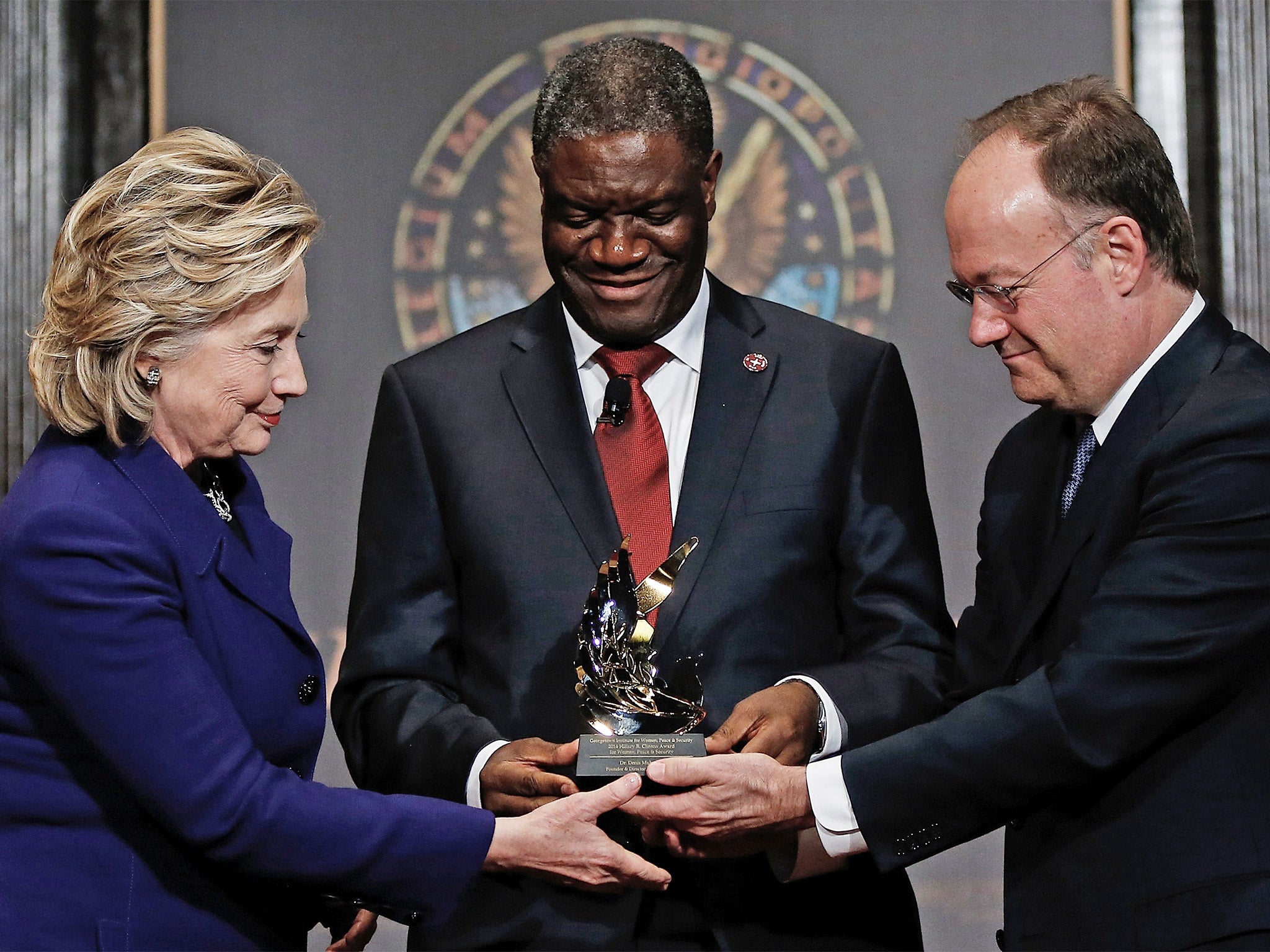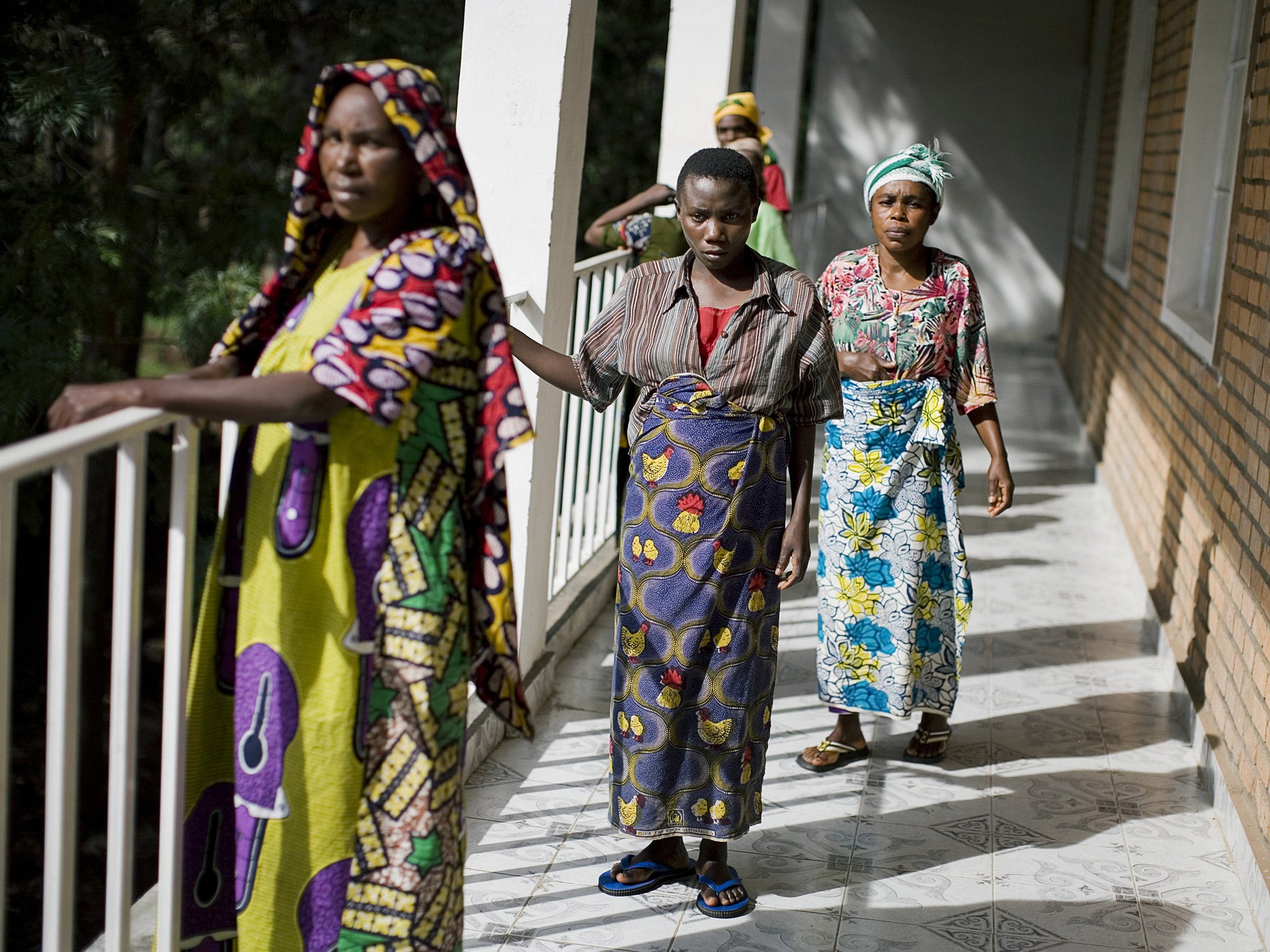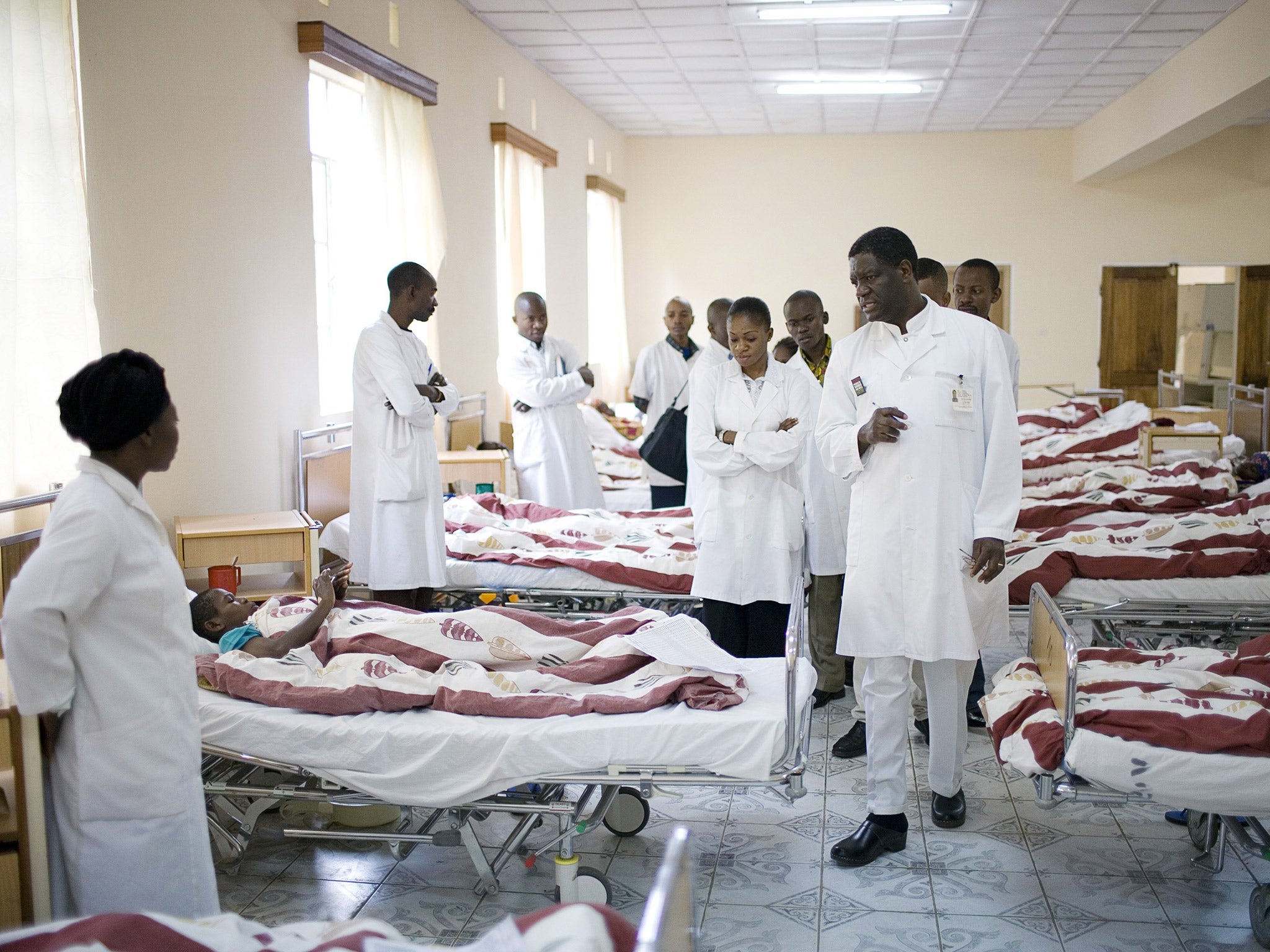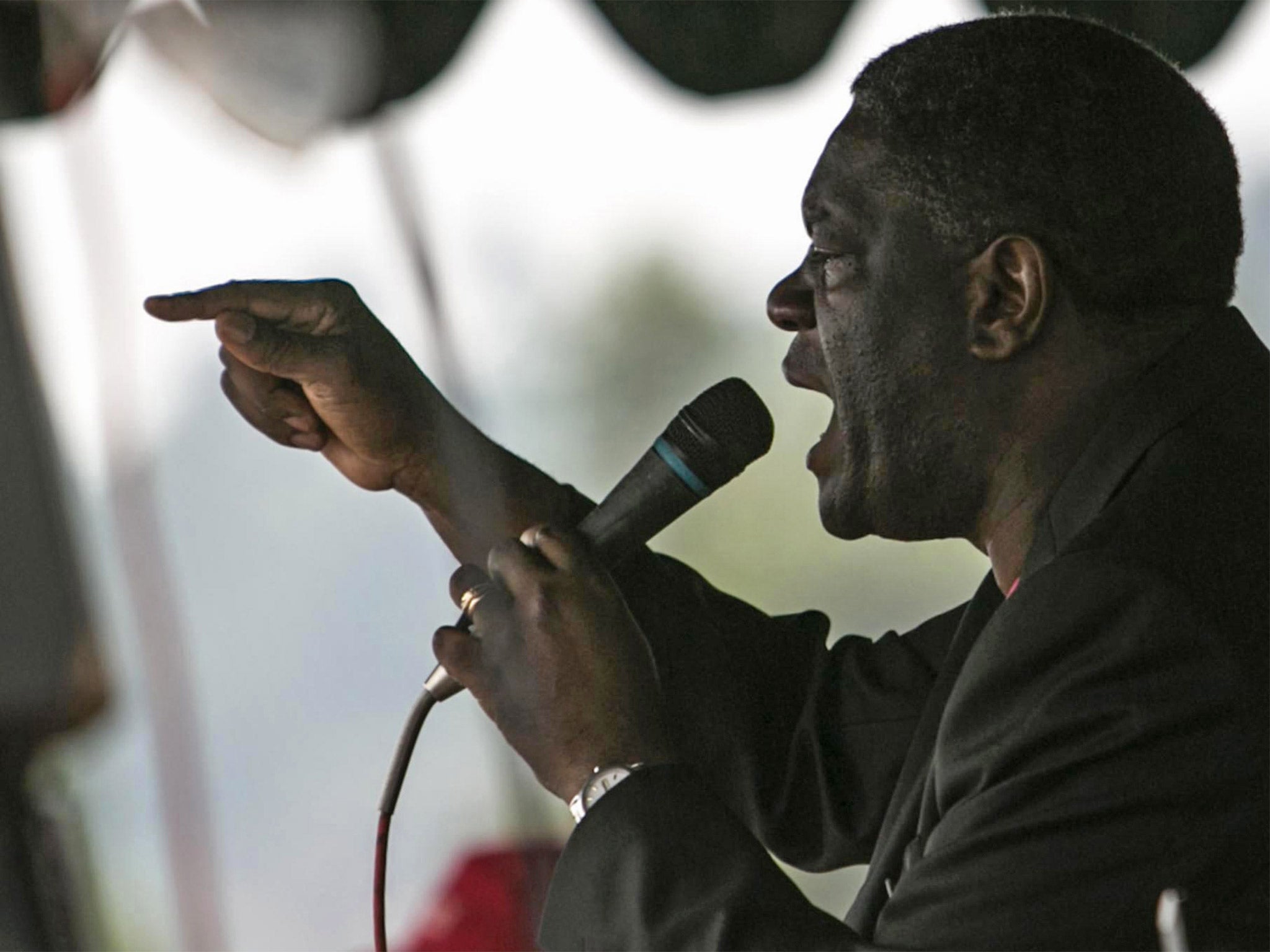Why rape is as deadly a threat as the world has faced: Congo's cheap weapon of mass destruction
Each day at the Panzi hospital in eastern Congo, Dr Denis Mukwege is trying to consign a devastating weapon of mass destruction to the past. The gynaecologist, who has been awarded the European Parliament's highest human-rights honour, talks to Patrick Strudwick

Some of the women arrive naked. Some are only just alive, with knife or gunshot wounds to the thighs, genitals or pelvis. Many have been raped repeatedly by multiple attackers, tied up and brutalised in front of their husbands, parents and children. Sticks are used on some. Chemicals on others, doused after the rape to burn and scar, to ensure ruination. It works. Internal injuries can be so extensive as to defy medical solution.
Dr Denis Mukwege tries to help all who arrive at Panzi Hospital, the clinic he set up 15 years ago in the hills above Bukavu, eastern Congo. After training in France to become a gynaecologist, he was hoping to devote his career to treating women in pregnancy and labour. Instead, the results of the Second Congo War arrived – wave after wave, girls as young as two, women in their eighties. Entire villages of women come, dozens clutching each other, silenced and bound by trauma's grip.
The war, which has claimed more than five million lives since 1998, officially ended in 2003 but continues in the east of the country. And so, children appear at Parzi's reception who are themselves the product of conflict rape, their mothers also used as a weapon of war. Rape, in the Democratic Republic of Congo, like many war-ravaged countries, is strategy, an implement to seize power – control, not only over entire communities and regions but, crucially, in this immense country, over the great mineral wealth. The trauma – physical, psychological – disables. And it is free. The cheapest weapon of mass destruction.
Today, 4,000 miles away, Mukwege sits on a stool in a lobby next to the plenary chamber in Strasbourg's European Parliament – a vast glass cylinder abuzz with technocrats, MEPs and media. Mukwege is here because he is the recipient of the Sakharov Prize For Freedom of Thought, the highest human-rights award bestowed by the European Parliament. Last year it honoured Malala Yousafzai. Many believe that Mukwege will, like Yousafzai, be decorated by the Nobel committee.
Posters bearing his face adorn each wall and corridor; an inapt iconography for a man wishing that the spotlight was not on him but the women he treats. Against the din of bustling officials and TV crews, Mukwege smiles and locks eyes with me. "This prize is not really for me," he says softly. "It belongs to the women who have been fighting for 15 years for their rights, for their dignity, for their freedom."
"But I am very happy this prize came now because the world does not understand what it means to be raped with extreme violence. We need to highlight what is going on in this region. It is a terrible disease, women destroyed in a way that denies their humanity."
Mukwege, 59, treats 10 women a day in theatre. He has, in total, tended to more than 30,000 survivors. In what psychological state are patients when they arrive?
"They are dehumanised," he says. "Most are shamed by what happened to them. Most are excluded from their own community. They feel life has no sense." He cites the plentiful research into the psychological trauma that survivors carry, often forever.
Dr Mukwege and his team do what they can. Soon after treating his first few patients in 1999, the doctor, whose father was a pastor, realised that medicine alone was insufficient. He describes the "four pillars" of his approach.
"We treat them medically – surgically; psychologically – the trauma; legally – to teach them their rights and help them go to court, if they want to," he says. "The fourth way is to support them economically so they can be strong and fight for their own rights."
Some, however, are too damaged for treatment. Dr Mukwege specialises in repairing vaginal fistulas – holes created either between the vagina and rectum, or vagina and bladder – a common occurrence after violent rape. "Women who have been severely violated are completely destroyed – some we simply cannot cure," he says. "And unfortunately, these are often young girls aged 14, 15, 16, 17. They have to wear a colostomy bag for the rest of their lives."

Without medical intervention, urine, blood and faeces trickle down, causing burns, infections, ulcerations, abscesses and dehydration. The smell from infections ensures everyone in the village knows what has happened. Many are shunned. Isolation engulfs. Fistulas can also lead to nerve damage called "foot drop" in which the lower limbs become paralysed. Women are left unable to walk.
"The situation is absolutely awful," says Mukwege, slowly, his French Congolese accent resonating around every syllable. He enunciates "rape" quite unlike anyone I have heard – the "r" is hard, like a German "r", the "a" is elongated; the effect is a snarl, an alarm, a pronunciation to denote the grotesque profundity of the crime.
"We are working with doctors and universities to get more technology into our hospital to improve the lives of those women, but unfortunately we still have to deal with failure."
He changes tack. "It's not the number [of women] that's important, it's the individual stories, it's the person sat opposite you who says, 'Doctor, I'm sorry, every time I come to see you people turn their heads away from me. They won't look'." Some of the patients return several times. A community might ignore her after being attacked but rapists do not, with some women being raped again and again.
By the time women are in Mukwege's care, the trauma has fanned out in all directions. "If a child has seen his mother being raped he will never be the same again," he says. "And if husbands stood by [during attacks], unable to help their wife, it completely changes their relationship. This problem destroys families as a whole."
There is another important consequence, which, for Mukwege is a "time bomb": the babies. "They are often not loved when they arrive because they are the result of rape. People sometimes blame the children. Often families say, 'This is a horrible child; he does not belong to us.' We are raising a crisis."
Among the thousands that he has treated – a fraction of the estimated millions of women raped amid this conflict – I wonder whether one patient stands out. "Yes," he says, exhaling slowly. "There is one lady. She was raped and taken into the bush and kept as a slave for three years. She was also, as a result of the rapes, contaminated with Aids. When she came home she found that while she was gone all her family – her husband, father, mother and four children – were killed." The woman eventually returned to her village but with a baby, born from the innumerable rapes she endured.
"It was very hard for her…" says Mukwege, his voice unsteady "to keep this child, to know, 'She is the child of the one who raped me, killed all my family and contaminated me with Aids'."
He stops again, frowning, wincing. "How can all this happen in the life of someone?"

We do not speak because he knows the answer. It is no secret why and how this happens. Rape emblemises Congo's history – an area brutalised for 500 years by leaders and nations crazed with greed in a rush for natural resources: rubber, oil, diamonds, copper, uranium, cobalt and coltan. The last of these is used liberally in mobile phones, cameras, printers and laptops. First came the Portuguese, in the 1480s, enslaving and destablising as British ships arrived taking captives. In the late 19th century, as demand for rubber spiked, Belgium's King Leopold II claimed the country, ordering further gargantuan enslavements, commanding torture and murder on an unfathomable scale: more than 10 million died.
By 1960, when independence was declared, the traumatised nation was ripped asunder, fractured, drained not only of minerals but of human resources: an insufficiently educated nation left to stagger on unaided. The former army officer and police sergeant Joseph-Desire Mobutu exploited the power vacuum, seized control and bled the resources further.
When Rwanda invaded in 1996 (the First Congo War), helping other neighbouring countries topple Mobutu – who had been backed by Western governments – little improved. A year later, when the Second Congo War erupted, drawing in nine nations, the turmoil was anarchic, dozens of rival militia groups, rebels and army factions killing and enslaving to gain control of the mines – a dire cacophony of child soldiers and mass starvation, collapsing infrastructure and, all along, rape.
This is why the women still come to the Panzi hospital, because a solution to the crisis does not. No one stops this.
In 2011, Mukwege compared the international reaction to that of Bosnia in the 1990s. "Since Bosnia was on Europe's doorstep, and Europe was ashamed, it didn't last so long," he said. "When it happens in Africa, people say, 'It's cultural. It's African. It's far away'." A year later, in an address at the UN he spoke of the "deafening silence and the lack of courage of the international community".
Some see such silence as deliberate, in order that the coltan keeps coming, regardless. It is possible, although lengthy and expensive, for companies to ascertain the provenance of most samples. However, all countries through which the metal passes would need to be signed up to ethical-sourcing policies and so far, although the United States has imposed restrictions on imports, the EU has not. "The West has a responsibility because it knows how coltan is produced," says Mukwege. "They can get this without destroying women." We, as Westerners, he adds, should stop buying the devices and buy instead products "without blood".
Meanwhile, the Panzi hospital is left with the wreckage. Its four pillars of care prove transformative for many. Mukwege returns to the woman who was enslaved. "Today she not only supports her child but also other patients living with Aids," he says. "She's really strong. She built her own house. She built her own business. She is a leader in her community."
Mukwege has admitted that after several years treating the severely traumatised every day he eventually had to stop listening to their accounts, encouraging the psychologists to step in. But, he added: "One does not get used to the suffering." Now, however, the mental battle for him is even tougher.
In 2012, not long after his UN speech – and many believe in response to it – five armed men went to Dr Mukwege's house, rounded up his two daughters, trained guns at their heads and waited for the doctor to come home.

When Mukwege got out of his car, the men pointed their AK47s at him. As his security guard attempted to save him, the hitmen shot the guard dead. Mukwege fell to the ground narrowly missing the bullets aimed at him. The attackers fled. They have never been caught.
In fear, Mukwege took his family to Sweden and then Brussels, living in exile for three months, until the women of Bukavu not only pleaded for him to return, but sold onions and pineapples to pay for his flight. On average women in the region earn less than $1 a day.
When he returned, in January 2013, they lined the streets, thousands cheering his homecoming. Reports described banners reading, "We are behind you", T-shirts saying, "Welcome our Superman", and a chorus of women singing in praise and thanks. Mukwege addressed the crowd: "The power of darkness will be defeated," he said.
But darkness lingers. How has he coped with the rumbling threat of murder? "It was very hard," he says. "Because I just thought, 'Why does this have to happen to me? What am I doing that's bad? I'm just trying to help people.' But if you say violence is not a good thing, you become a dissident. This is terrible. People have to hide because they say violence is not acceptable."
Mukwege has to hide, too. No longer safe at his home, he moved in to the hospital. One well-wisher told him, "We women will protect you." And now they do – a doctor buffered by his patients. "I don't have any social life," he says. "But I'm not complaining, I'm happy to be doing what I'm doing because when I can see how strong women are, all my strength, all my inspiration comes from them."
Even though carrying on could put his family in danger? "I think my family supports me," he says. Does he ever think about stopping? "Never. If I give up, it would be to accept that all the perpetrators are right. So I will not give up. It is perpetrators who will give up."
As I get up to leave one final question blurts out. Do you believe in God? "Yes," he says.
Even after everything you have seen?
"For me, God gave us a choice to do bad or good. We are free. It is our choice. "
The next morning, at a press conference, he calls on reporters and politicians to intervene. "What is being done to protect these women?" he asks. "We need a justice in which victims have the opportunity to confront their attackers. This will never happen unless there is a political change.
"We need your voices – if the media decided that a situation has to change you have the power. You can give the information to 500 million people so that they know that when they use their telephone, [they are aware of] the victims. You can ensure the people send that message to politicians. What we're missing today is the political will to change – so that the minerals can be mined cleanly. There are multi-nationals in Europe, who are transparent and can give us all a good conscience."
He turns to the men. "If men can stand up and say 'this is not acceptable' then our world can change. Otherwise our silence says, 'this is a woman's problem'. Those who commit these acts dirty our image as men."
As Mukwege speaks his hands form points, cones, gavels, punching through each phrase, his body and voice united in urgency. It is not enough to listen to me, his presence cries.
The chairperson tries to draw the session to a close, but Mukwege leans in to the microphone. "We have an opportunity to draw a line under using rape as a weapon of war," he cries. "To say no, to say this is not acceptable. We've done this with chemical and biological arms and we can do the same thing for sexual crimes."
His eyes – yellowed, wide – emit a plea too, beseeching, bellowing out beyond the parliament, beyond the EU, begging the world to listen to a message sent from hundreds of thousands of women, butchered and shunned and broken: do something.
Join our commenting forum
Join thought-provoking conversations, follow other Independent readers and see their replies
Comments